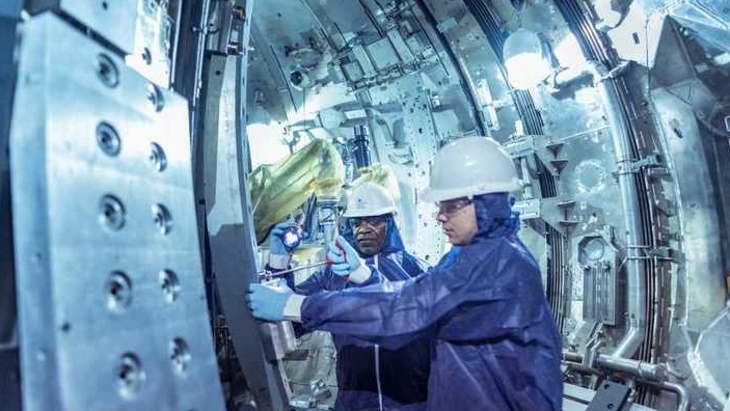CFS, UKAEA to collaborate on fusion research
The UK Atomic Energy Authority (UKAEA) and the USA's Commonwealth Fusion Systems (CFS) have signed a five-year Collaboration Framework Agreement aimed at advancing commercial fusion energy.

Inside the JET fusion training facility (Image: UKAEA)
The agreement establishes the terms under which a series of work projects between CFS (a Massachusetts Institute of Technology (MIT) spinout company) and UKAEA will support the development of fusion energy and related technologies.
In a joint statement CFS and UKAEA said the scope of the collaboration could include: operations teams sharing and learning best practices from fusion experiments; access to fusion-adjacent technology facilities, including robotics; collaboration on fuel cycle technologies, neutronics modelling, systems integration models, advanced manufacturing, diagnostics, remote handling and remote maintenance; and collaborative work to identify and answer emerging plasma physics questions.
"This agreement is the result of a shared mission of both organisations to leverage innovative research and the speed of the private sector to support the fastest path to low-carbon commercial fusion energy - based on the same processes that power the sun and stars," they said.
"Achieving our shared missions to deliver low-carbon and sustainable fusion energy involves working at the forefront of science, engineering, and technology," said UKAEA CEO Ian Chapman. "This new collaboration agreement with CFS will help push these developments and capabilities, drive innovation and accelerate progress.
"Fusion presents an exciting opportunity for the UK and we're proud our ground-breaking work here continues to support economic growth and attracts such leading international partners."
CFS CEO Bob Mumgaard added: "CFS and UKAEA have a mutual interest and strong belief that public-private collaborations such as this represent a way to accelerate advances in commercial fusion energy technology and support CFS' plans to deliver commercial fusion as quickly as possible.
"UKAEA is a leader in fusion energy research and CFS plans to establish a UK presence as we leverage the combined skills and talents of both organisations to develop the fastest path to commercial fusion power on the grid."
CFS is collaborating with MIT to leverage decades of research combined with new groundbreaking high-temperature superconducting (HTS) magnet technology. These magnets will enable compact fusion power plants that can be constructed faster and at lower cost.
In May, MIT Plasma Science and Fusion Center (PSFC) signed a new five-year agreement with CFS to expand its fusion energy research and education activities.
CFS is working to build the SPARC prototype fusion machine which it says will pave the way for a first commercially viable fusion power plant called ARC. SPARC is described by PSFC as a compact, high-field, net fusion energy device which would be the size of existing mid-sized fusion devices, but with a much stronger magnetic field. It is predicted to produce 50-100 MW of fusion power, achieving fusion gain greater than 10.
The UKAEA conducts out fusion energy research on behalf of the UK government. It oversees the UK's fusion programme, headed by the MAST Upgrade (Mega Amp Spherical Tokamak) experiment. It also hosts the world's largest fusion research facility, JET (Joint European Torus), which it operates for scientists from around Europe.
Researched and written by World Nuclear News
- China Institute of Atomic Energy
- Nuclear Power Institute of China
- Southwestern Institute of Physics
- China Nuclear Power Operation Technology Corporation, Ltd.
- China Nuclear Power Engineering Co., Ltd.
- China Institute for Radiation Protection
- Beijing Research Institute of Uranium Geology (BRIUG)
- China Institute of Nuclear Industry Strategy (CINIS)
- China Nuclear Mining Science and Technology Corporation


